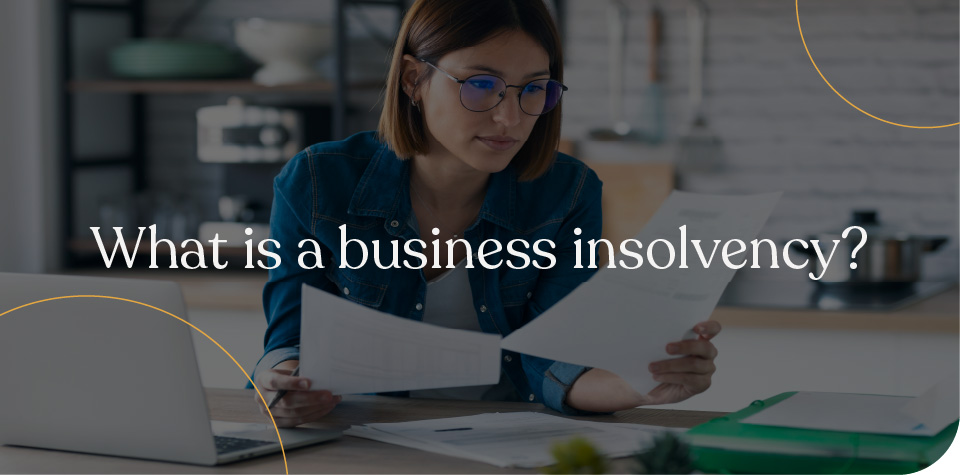
What is business insolvency? A guide to business insolvency & how it works
We often hear, “what is business insolvency? Is it the same as bankruptcy?” In this guide, we will explain what an insolvent company is, how they get insolvent as well as ways to try and stop getting insolvent.
When a company can’t pay its bills, it is considered an insolvent company. This could be either:
- Company directors can’t pay its bills when due
- It has more liabilities than assets on its balance sheet
An insolvent company is at risk of being shut down, but directors may be able to take steps to allow the company to continue to trade.
Even if your company is experiencing financial difficulties, it is important to understand the options and the consequences of insolvent companies.
Also, you should consider seeking professional legal action and advice from:
- Citizens Advice Bureau
- Solicitor
- Qualified accountant
- Authorised Insolvency Practitioner
- Reputable financial advisor
- Centre for debt advice
Business insolvency can be defined as a situation in which a company cannot pay its outstanding debts. This could be due to cash flow problems or liabilities that exceed its assets.
If you are concerned about insolvency, there are certain warning signs that you should be aware of.
Insolvency is a condition in which a company loses its business. However, insolvency can sometimes lead to complete closure. There are steps that companies can take to avoid this.
We will be looking at some questions you might have if you choose this path. We can help get you approved for a business loan, start online below:
What is business bankruptcy?
Businesses are insolvent when they can’t pay their company debts. This could be due to cash flow problems, which means that bills aren’t being paid or that the balance sheet shows more liabilities than the company’s assets.
What is the difference between insolvency, bankruptcy, and liquidation of business?
Insolvency refers to the condition in which a person or company has insufficient assets and cash flow to pay its liabilities and debts.
Business insolvency is, in essence, the same thing as personal insolvency.
Bankruptcy refers to insolvency. It is mainly applicable to individuals and sole traders.
Company liquidation is the process that replaces bankruptcy for limited companies. This is when the business is wound up or shut down to allow it to sell its assets and repay creditors.
What happens if a company declares bankruptcy?
Declaring insolvency is a company declaring bankruptcy. This means that the company prioritises the repayment of its business debts. It may be necessary to cease trading immediately so the debts don’t build up.
A private insolvency practitioner is usually hired by businesses to help them decide if this is necessary or if they can improve their chances of repaying creditors by continuing to trade.
It is important to remember that the insolvency process for Scotland differs from that in England and Wales.
What are the signs that a company is insolvent?
There are several red flags that can be spotted if your business is in danger of going bankrupt. These are:
- Creditors who aren’t paid have been threatening legal action
- The company’s overdraft has exceeded its limit
- Rejection of credit applications
- Unpaid wages
- missing HMRC’s tax payment deadlines
The UK government website provides a place where you can check the status of a company to see if it is insolvent or in liquidation proceedings.
What does it mean to be in liquidation?
Liquidation refers to closing down a business so its assets can be sold to pay its debts. For companies that are solvent, but want to close, it may be a company voluntary arrangement.
It usually involves a insolvent company that cannot continue to operate because of financial difficulties. It is also known as compulsory liquidation. Creditors have requested a court to issue a winding-up order.
Although it is ideal to sell the assets so that creditors can be paid, this is not always possible.
However, liquidation does not apply to sole traders as there is no legal distinction between the individual and the business.
For sole traders, there are two options for insolvency: bankruptcy or individual voluntary arrangements (IVAs), and sequestration and Protected Trust Deeds (PTDs) in Scotland.
Is it possible for a business to survive insolvency while still being able to trade?
Insolvency does not necessarily mean that a company must stop trading. Sometimes, the insolvency process may allow the company to bounce back and continue its business.
Some companies employ corporate recovery specialists to help them solve their debt problems and allow them to trade on the company’s behalf.
If a court finds that the company is unable or unwilling to repay its debts, it can be charged with wrongful trading. The directors of limited companies may now have to repay the debts, which could be a significant change from when they were protected.
How to solve insolvency
There are other ways to deal with insolvency, which don’t involve liquidation or any other legal procedure.
Many companies seek informal agreements with creditors. A repayment plan is then put in place that suits all. While this may incur higher interest payments and come with some risk, it can be an option if good relationships between the business and its creditors exist.
Getting a business loan to help trade out of the current financial situation may be a good idea to help introduce cash in to the business if you know that the business can survive.
A company voluntary agreement (CVA), which is similar to an informal arrangement with creditors, allows the company to continue trading.
In order to avoid liquidation, some companies choose to go into administration. Insolvency practitioners take control of a business and create a recovery plan. They also seek repayment agreements with creditors.
It is often followed by liquidation but it does not always. This gives the company some hope that it will be able to trade while it addresses its debts.
Can I set up a new company after a liquidation?
After a liquidation, there is no reason not to start a business. However, there are some important things to keep in mind.
You should not use the same name as your old company. Otherwise, you could be charged with ‘passing off’. This is outlined in Section 216, 1986 Insolvency Act.
There may be more practical obstacles, particularly if you have been involved in multiple company liquidations.
HM Revenue & Customs may require a security deposit if your company falls behind in tax payments. Some suppliers might be reluctant to make arrangements with companies linked to liquidations.
Experiencing temporary financial difficulties
You should seek advice from an accountant, qualified solicitor, or authorised insolvency practitioner if your company is facing financial difficulties. Before appointing an insolvency practitioner, ensure you understand the costs involved.
We offer free advice and resources that can help people manage their business finances and debts. They are available via phone, webchat and website.
Avoid company insolvency:
1. Take a look at the larger picture
It won’t solve the problem by burying your head in the daily operations or working harder. However, it is often the best solution for many hardworking business owners to increase cash flow liquidity and trade out of the bad situation.
Instead, look at the larger picture. What strategies are you able to implement that will help? What should you stop doing? What are the areas of your business that are causing you to lose cash?
Some business who are borderline insolvent can have impaired credit ratings because they have not been paying suppliers. In these cases you may look into a business loan for bad credit, which will give you some options for finance, although at a higher interest rate.
2. Changes can be made to your company’s way of doing business
Directors of companies should evaluate the viability and validity of contracts and plans to avoid future cash flow problems. If the employees aren’t qualified financial professionals, it might be better to outsource this task.
It may be worthwhile to seek professional advice if you are able to negotiate some of the company’s debts. It’s in the creditors’ best interests to get their money back.
Preparing for unexpected costs that could lead to your company’s demise is crucial.
3. Reduce your operations
Focusing on the basics often allows you to return to the most profitable areas of your business. This could mean redundancy or selling assets. It also means that you will need to analyze exactly what your business needs.

